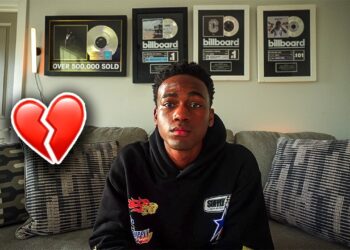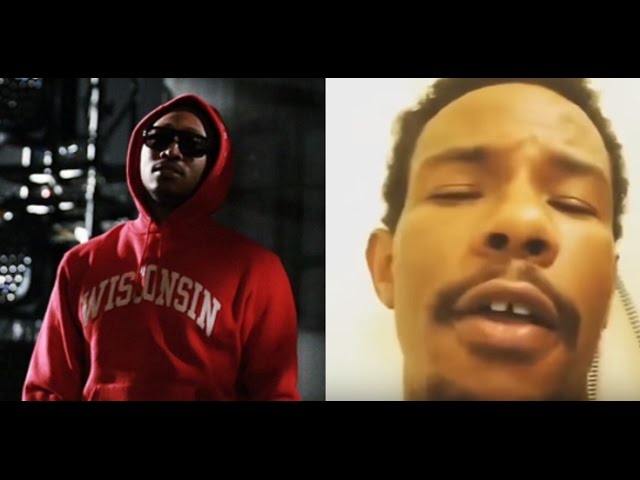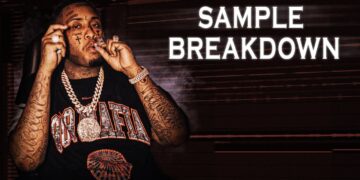Anno Domini
Anno Domini (“AD”) grew up in Munich, Germany before moving to England in 1997. A huge Hip Hop fan throughout his youth, he started making his own beats on a laptop in his university dorm room one afternoon in 2004. Thus Anno Domini Beats was born! With a decade of music production behind him he has since honed his skills and developed an ear for instrumentals ranging from epic orchestral arrangements to silky soul tunes. Anno Domini helped pioneer the sale of music licenses online and grew his own brand into a global symbol for high quality production. He has taken his love for music from a teenager’s bedroom to an international platform encompassing a music production team of multi-platinum selling and award-winning producers, a record label and a gradually expanding multimedia empire, with over 100 million website hits and legions of fans. Anno Domini has worked on projects with Vinnie Paz (Jedi Mind Tricks), Kool G Rap, Wu-Tang Clan, Royce Da 5’9, D12, Ras Kass and many more, as well as receiving the honour of being nominated as a finalist in the Enterprising Young Brit Awards 2010. He also gained a distinction level Master’s degree in Management from the London School of Economics and has a keen interest in business and entrepreneurship.
http://www.soundclick.com/annodominibeats
http://www.twitter.com/annodominibeats
http://www.myspace.com/annodominibeats
http://www.facebook.com/annodominibeats
2Deep
2Deep made his first steps into the Hip Hop arena as an emcee in 2004, where at 15 he embodied the rebellious teen, skipping class and causing trouble. Back then he would buy beats from Anno Domini, not realising that in a few short years time the two would partner to become one of Hip Hop’s best known beat production team. After his first tentative mixtape and album releases and while pursuing schooling at a metal workshop, he decided to quit his job and left for the US to complete high school. Thrown into a new environment with no friends and nothing to do, he turned to the art of beat-making. Captivated, he would work solidly from the moment he came back from school to the moment he fell asleep. In the process he built a growing friendship with Anno Domini, who, impressed with his rapidly progressing skills as a beat-maker, invited him to join the Anno Domini Beats crew. In the years since, 2Deep has ascended to full production partner and manager at Anno Domini Beats. He has worked on music projects with the likes of Shyheim, Method Man, Rick Ross, Tech 9Ne and Sexion D’Assaut which went platinum in France, and continues to thrill listeners with his gritty melodies and hard-hitting drums.
https://twitter.com/2DeepBeats
http://www.2deepbeats.com/
http://www.facebook.com/2DeepBeats
Screwaholic
Screwaholic’s path to music production began in 1997 when he crafted his first beat. As part of the Hip Hop group Birkenwald he quickly honed his own unique style as DJ and producer and even though he stepped to the mic from time to time, it was clear where his talents and his future lay. Screwaholic is a household name in Germany, where his production can be heard on releases by major rappers such as Azad, Eko Fresh, Donato, Saad and Bushido, whose album went platinum. He has also worked with numerous French and Swedish Hip Hop artists, as well as releasing several chillout lounge collections and writing a music production book.
https://twitter.com/Screwaholic
http://de-de.facebook.com/Scr3waholic
http://www.youtube.com/user/screwaholic/
http://www.screwaholic.com
Vherbal
Vherbal is a veteran in the game, having started his music production career in 1996. A true gear-head, his first piece of equipment was a Yamaha DJX and he has since graduated to Cubase, Reason, Emu XBoard and Pioneer CDJ-800s. With a colourful career history that flits between batting away groupies in a semi-famous fledgling pop group to managing a fast food restaurant, Vherbal has truly established himself as a boom bap Hip Hop producer, working with the likes of Vinnie Paz, Canibus, Diabolic, RA The Rugged Man, Kool G Rap, Chief Kamachi and Ill Bill. As well as producing for the Anno Domini team, Vherbal runs the Anno Domini Records Studio in the US and offers mixing and mastering services specialising in that raw Hip Hop sound.
https://twitter.com/vherbal
http://www.vhind.com/
http://www.facebook.com/vherbal
Life & Death
Life & Death is from the icy plains of Finland but his beats are guaranteed to melt your speakers! Describing himself as an ordinary guy who one day decided to start making beats with no prior experience of anything even remotely related to music, he is proof that where there is a will there is a way. Through the years he has developed his craft from composing to producing without any formal musical training and in recent years made a real name for himself as a serious producer, gathering thousands of loyal fans and millions of recorded song plays. His credits include the likes of Kutt Calhoun, Chino XL, Infamous Mobb, Diabolic, Randam Luck and Turkish Hip Hop legend Sansar.
http://twitter.com/lifeadeath
http://www.youtube.com/user/LifeADeath
http://www.facebook.com/Lifeanddeathproductions
http://www.lifeanddeathpro.com/
Scarebeatz
Scarebeatz is another self-taught producer, whose path to the music industry started in 2006. A natural on the keys, he quickly released his first producer album with a range of German underground emcees in 2007 which was downloaded over 50,000 times. He continued to make waves in Germany, producing for the likes of Harris, Frauenarzt, King Orgasmus and Sentino. As he expanded his craft internationally he added the likes of Lazee (Sweden), Casus Belli (France) and Eminem super group D12 to his credits. What’s more, after years of frustration with sub-par track mixes on his beats, Scarebeatz took it upon himself to become one of the industry’s best respected mixing and mastering engineers and his services, sought after by everyone from Wu-Tang Clan to Jedi Mind Tricks, are now also available to you in our mixing and mastering services section.
http://twitter.com/scarebeatz1
http://www.youtube.com/user/Scarebeatz
http://www.facebook.com/scarebeatz1
http://www.scarebeatz.com/
http://soundcloud.com/scarebeatz
Tim Ross
Tim Ross started out in 2005 song writing for various production teams around London, England. In 2006 he was awarded the “Young Peoples Choice Award” which gave him the push to start producing and selling instrumentals on the internet music market. By 2010 he had sold over 2000 leases, obtained over a million song plays and worked with companies such as White Label Records, Black Ent Music and Sony. Tim Ross has always had a love for R&B but Hip Hop is his real forte. He is already on the way to conquer the UK music scene with well-known artists under his production such as Smartz, English Frank, Jay Keyz, Jay Placid and many more. As well as producing for the Anno Domini team, Tim Ross runs the Anno Domini Records Studio in London.
https://twitter.com/TimRossBeatz
http://www.timrossbeatz.com/
Oskar Mike
Oskar Mike grew up in Winnipeg, Manitoba, Canada before moving to Halifax, Nova Scotia in 2007. Listening to producers such as 7L, Pete Rock and Stoupe growing up, he found heavy influence in underground instrumental production. Beginning his endeavour into music and audio production in 2005, Oskar Mike is on a mission to create instrumentals with grit and intensity. Known for using samples from many different sources and making them work together, he creates hard hitting tracks with a unique sound that is guaranteed to inspire. Oskar Mike is known for his dark and heavy underground beats and has a signature underground sound.
https://twitter.com/oskarmike
http://www.oskarmike.com/
http://www.facebook.com/oskarmikemusic
http://www.youtube.com/oskarmiketv
http://annodominination.com/
http://www.soundclick.com/alcatrackz
https://plus.google.com/u/0/102632926993930270079
http://en.wikipedia.org/wiki/Anno_Domini_Beats
http://www.myspace.com/annodominibeats
http://itunes.apple.com/us/artist/anno-domini-beats/id157639648











![How WE Produced “On Your Own” by Lil Tecca + [FREE KIT]](https://beatmakingvideos.com/wp-content/uploads/2025/11/how-we-produced-on-your-own-by-lil-tecca-free-kit-1-360x180.jpg)

